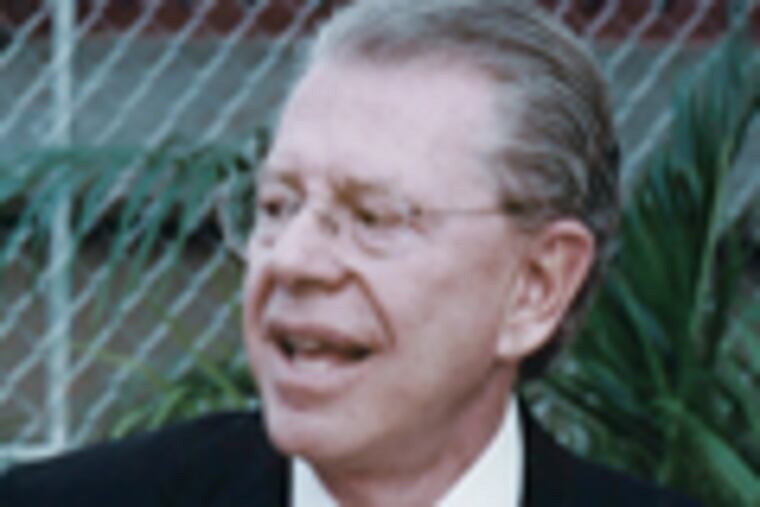George M. Ross, 77, philanthropist and civic leader
Kimmel Center president Anne Ewers will never forget the first time she met George M. Ross, who, as a member of the search committee, was interviewing her for the post in 2007.

Kimmel Center president Anne Ewers will never forget the first time she met George M. Ross, who, as a member of the search committee, was interviewing her for the post in 2007.
He was describing the Kimmel's gala opening night in 2001, and his eyes began to well with tears.
"It meant the world to me to know how passionate he was about the Kimmel Center," Ewers said. "If George believed in something, he put all his energy, his focus, his support behind it."
Mr. Ross, 77, an investment banker and one of the city's most dedicated philanthropists and civic leaders, died Friday, July 8, at his home in Bryn Mawr. He had been found to have lung cancer about 15 months ago.
Mr. Ross' legacy is visible throughout Philadelphia, whether in the gleaming Kimmel Center, Drexel University's expanding campus, or his most recent and cherished project, the National Museum of American Jewish History, for which he almost single-handedly raised $154 million.
"His first thought was always, 'How can I help the city?' " said Joe Camarda, who worked with Mr. Ross at Goldman Sachs & Co. for 30 years and served with him on the Philadelphia Orchestra's board of trustees.
Though ill, Mr. Ross attended the Jewish museum's star-studded opening last fall and gave a speech. It was the culmination of a decade of planning.
"He was very passionate about it because he realized how important it was to tell the story of the American Jewish experience," said his wife, Lyn.
Passionate is a word that comes up a lot when people talk about Mr. Ross. When he got involved, he did not just lend a hand, he took charge and made things happen.
Take his involvement with Drexel, from which he graduated in 1955.
As chairman of the board of directors in the 1990s, he ushered the university through one of its most difficult times. With finances shaky and enrollment declining, Mr. Ross "did not panic," Drexel president John Fry said. "He focused on getting a great new president."
He was referring to Constantine Papadakis, who led the university through an unprecedented period of growth from 1995 until his death in 2009.
The other thing Mr. Ross did was buy the former Bulletin building, at 3100 Market St., an unpopular move given the school's financial picture. Today, "that piece of land is one of our most valuable assets," Fry said.
Mr. Ross' other great love was the Philadelphia Orchestra, on whose board he had served since 1985.
"He taught me that giving back to the city is something you do not because you love the orchestra, or you love the Art Museum. You do it because you love Philadelphia," Camarda said.
Mr. Ross grew up in a modest rowhouse in West Philadelphia with a traveling-salesman father and a determination to make a better life for himself.
After studying business at Drexel, he attended one semester of law school at the University of Pennsylvania before getting sick and dropping out. A professor at Drexel was an investment banker, and Mr. Ross thought he would like to give that field a try.
A job interview in Vineland, N.J., paid off, though Mr. Ross did not end up working there. But his future wife did. He took one look and called her the next day.
In 1971, he became one of Goldman Sachs' youngest partners and the only person from the Philadelphia office to be named a partner in the firm.
Among Mr. Ross' other civic activities, he cofounded Operation Understanding in 1985 with U.S. Rep. William H. Gray III, bringing together Jewish and African American youths to travel to Israel and Africa to learn about each other's cultures. He also served on the boards of the Jewish Federation of Greater Philadelphia and the United Way of Southeastern Pennsylvania.
After he retired in 1990, he and his wife loved traveling, and they spent winters in Palm Beach, Fla.
In addition to his wife, he is survived by a son, Michael; a daughter, Merry; two grandchildren; and a brother.
A service will be held at noon Tuesday, July 12, at the National Museum of American Jewish History, 101 S. Independence Mall East, Philadelphia 19106. Memorial donations may be made to the museum.